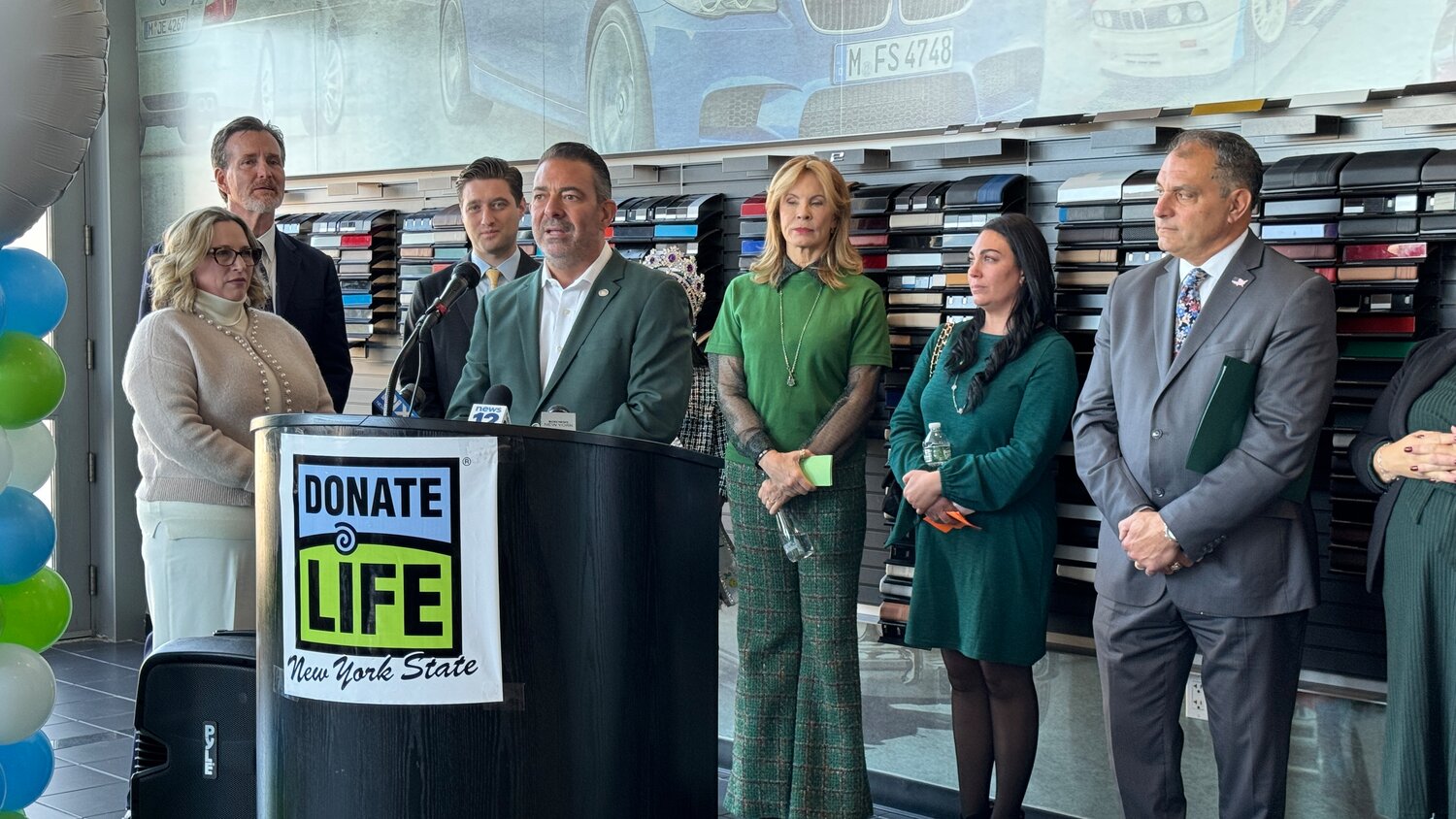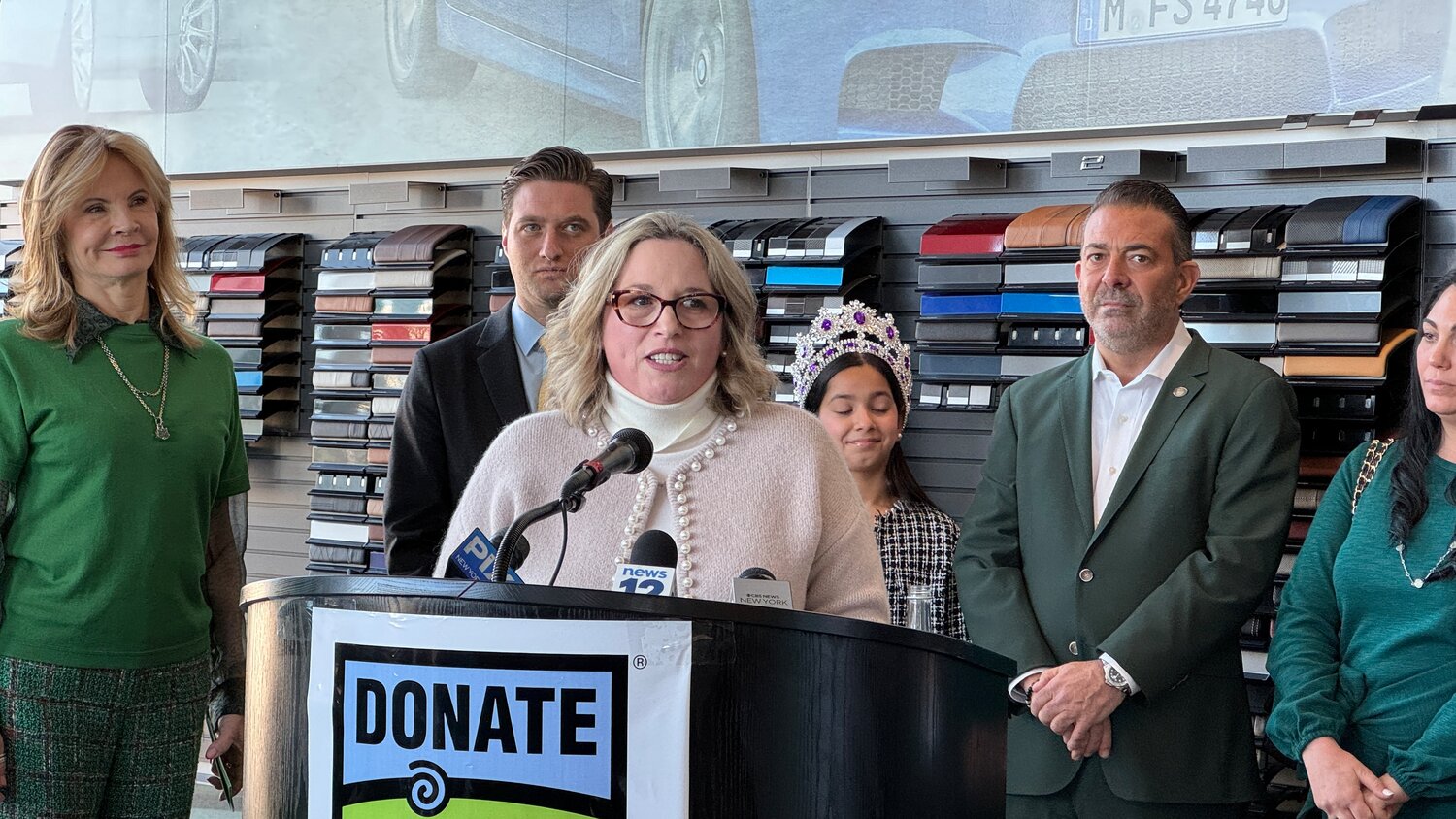At Westbury dealership, importance of becoming an organ donor is stressed
At a Westbury car dealership last week, Matt Carlson, Rallye BMW’s general manager, was able to tell his friends and colleagues that he’d be receiving the gift of life — a new kidney — from his daughter, Stephanie Trotti. And while he’s abundantly fortunate, many people in New York that need an organ aren’t as lucky.
There’s nearly 8,000 people in the state on a waiting list for a life-changing donation, and while 3,300 residents received an organ donation last year, roughly 400 people on the transplant list die each year due to a shortage of donors. In New York, only 47 percent of the population is signed up to be an organ donor through the New York State Donate Life Registry— the lowest percentage in the country.
Rallye Motor Company, which has dealerships in Westbury, Rosyln and Glen Cove, partnered with Donate Life New York State, a nonprofit organization, to bring attention to Carlson’s story, and raise awareness about the life-changing impact of organ, eye and tissue donations.
Juliana Terian, president and chief executive officer of the Rallye Motor Company, said the New York State Auto Dealers Association, and car dealerships, play a huge role in assisting Donate Life.
“Dealerships are vital to organ donation,” she said at a news conference on Jan. 5. “We need so much to educate people on the importance of being able to donate. Forty-seven percent of the population in New York is signed up to be an organ donor — we have a long way to go. The goal here, with (Donate Life), is to ensure a life changing transplant for every New Yorker in need.”
Aisha Tator, the executive director of Donate Life New York State, said a reality that many may not realize is that you may never know when you, or someone you love, needs an organ.
“There’s hundreds of different ways that you can have organ failure,” Tator said, “some of them as simple as a virus. We just don’t know when we might need a transplant to save our life. We’re working together to raise awareness, to spread this important message, that New Yorkers need to enroll in the New York State Donate Life registry.”
John Flanagan, chair of the board of directors at Donate Life New York State, and the senior vice president of government affairs at Northwell Health, pulled out his driver’s license, and showed the crowd the small heart symbol on it, signifying that he’s a registered organ donor.
“You can save somebody else’s life,” he said. “It’s very, very rare when someone has the opportunity to say that — and we’re seeing it happen live, family to family.”
Carlson said he has polycystic kidney disease, a hereditary condition that his mother died from 8 years earlier. It’s a rare genetic disorder that causes fluid-filled cysts to grow in the kidneys and other organs, affecting their function and health. Children of those with the disorder have a 50 percent chance of inheriting the illness, and Carlson, and his four brothers, all have it.
His kidney health began to significantly worsen over the last few years, and for the last six months, he’s been on dialysis — a blood purifying treatment given to someone when kidney function is not optimum. When it became clear that a kidney transplant would be the best course of action, he said both his son and daughter immediately got tested.
“My daughter, Stephanie, came back as a perfect match,” he said. “I’ve been on dialysis the last six months — it’s not a good lifestyle. And I’m looking forward to Monday, to getting my daughter’s kidney, and having a piece of my daughter inside of me. I can’t even express the gratitude I have to my daughter, and also my son, for running — not walking — running to get tested. And I will dedicate the rest of my life to working with great organizations like (Donate Life) to educate people on how important organ, tissue donation is.”
He said it was hard for him to realize that some of the patients he’d received dialysis alongside may never get as lucky as him, which is why it’s crucial that more New Yorkers sign up to be organ donors.
“It was a very hard and emotional day Wednesday, to walk out of that dialysis center, to say goodbye to them, because they don’t have a donor,” Carlson said. “I can live without my kidneys — we have an artificial machine called dialysis. But it’s not fun. I am just blessed.”
Those who are not registered to donate an organ can do so through the Department of Motor Vehicles, or by visiting Donate Life’s website, DonateLifeNYS.org/register.










